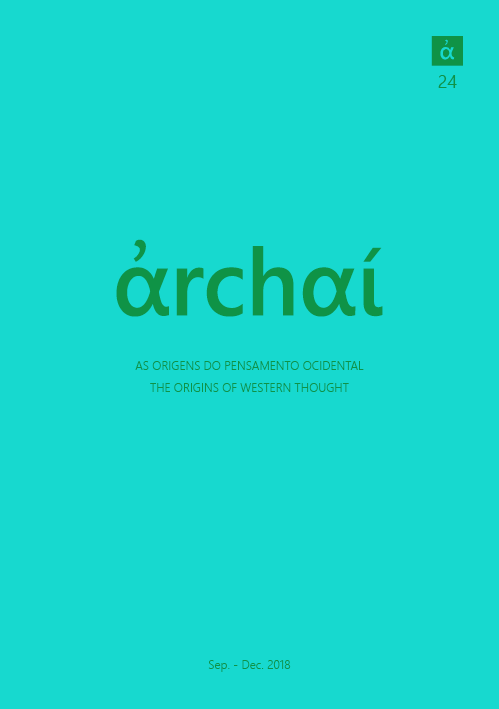Explanation and Essence in Posterior Analytics II 16-17
DOI:
https://doi.org/10.14195/1984-249X_24_8Keywords:
Aristotle, Explanation, Essence, ScienceAbstract
In Posterior Analytics II 16-17, Aristotle seems to claim that there cannot be more than one explanans of the same scientific explanandum. However, this seems to be true only for “primary-universal” demonstrations, in which the major term belongs to the minor “in itself” and the middle term is coextensive with the extremes. If so, several explananda we would like to admit as truly scientific would be out of the scope of an Aristotelian science. The secondary literature has identified a second problem in II 16-17: the middle term of a demonstration is sometimes taken as the definition of the minor term (the subject), other times as the definition (or the causal part of the definition) of the major (the demonstrable attribute). I shall argue that Aristotle’s solution to the first problem involves showing that certain problematic attributes, which appear to admit more than one explanation, actually fall into the privileged scenario of primary-universal demonstrations. In addition, his solution suggests a conciliatory way-out to our second problem (or so I shall argue): the existence of an attribute as a definable unity depends on its subject having the essence it has, which suggests that both the essence of subjects and the essence of demonstrable attributes can play explanatory roles in demonstrations.
Downloads
References
ANGIONI, L. (2012). Os seis requisitos das premissas da demonstração científica em aristóteles (Segundos Analíticos I 2). Manuscrito 35, p. 7-60.
ANGIONI, L. (2013). Knowledge and Opinion about the same thing in APo A-33. Dois Pontos 10, p. 255-290.
ANGIONI, L. (2014a). Demonstração, silogismo e causalidade. In: ANGIONI, L. (ed.). Lógica e Ciência em Aristóteles. Campinas, Editora PHI, p. 61-120.
ANGIONI, L. (2014b). Aristotle on Necessary Principles and on Explaining X through X’s essence. Studia Philosophica Estonica 7, n. 2, p. 88-112.
ANGIONI, L. (2016). Aristotle’s definition of scientific knowledge (APo 71b 9-12). Logical Analysis and History of Philosophy 19, p. 79-105.
BARNES, J. (1993). Aristotle. Posterior Analytics (translated with a commentary). 2ed. Oxford, Clarendon Press.
BRONSTEIN, D. (2015). Essence, Necessity, and Demonstration in Aristotle. Philosophy and Phenomenological Research 90, n. 3, p. 724-732.
BRONSTEIN, D. (2016). Aristotle on Knowledge and Learning: The Posterior Analytics. Oxford, Oxford University Press.
CHARLES, D. (2000). Aristotle on Meaning and Essence. Oxford, Clarendon Press.
CHARLES, D. (2011). Remarks on substance and essence in Aristotle’s Metaphysics Z.6. In: MORISON, B.; IERODIAKONOU, K. (eds.). Episteme, Etc.: Essays in Honour of Jonathan Barnes. Oxford, Oxford University Press, p. 151-171.
FEREJOHN, M. (2013). Formal Causes: Definition, Explanation, and Primacy in Socratic and Aristotelian Thought. Oxford, Oxford University Press.
FINE, K. (1995). Ontological Dependence. Proceedings of the Aristotelian Society 95, p. 269-290.
HASPER, P. (2006). Sources of Delusion in Analytica Posteriora I.5. Phronesis 51, p. 252-284.
IRWIN, T. & FINE, G. (1995). Aristotle. Selections (translated with introduction, notes and glossary). Indianopolis, Hackett.
KOSMAN, L. (1973). Understanding, Explanation and Insight in the Posterior Analytics. In: LEE, E. N., MOURELATOS, A. P. D. & RORTY, R. M. (eds.). Exegesis and Argument, Studies in Greek Philosophy presented to Gregory Vlastos. New York, Humanities Press, p. 374-392.
LENNOX, J. G. (1987). Divide and Explain: The Posterior Analytics in Practice. In: GOTTHELF, A.; LENNOX, J. G. (eds.). Philosophical Issues in Aristotle’s Biology. Cambridge, Cambridge University Press, p. 90-119.
LOUX, M. (1991). Primary Ousia: An Essay on Aristotle's Metaphysics Z and H. Ithaca, Cornell University Press.
MALINK, M. (2013). Aristotle’s Modal Syllogistic. Cambridge MA, Harvard University Press.
MCKIRAHAN, R. (1992). Principles and Proofs. Princeton, Princeton University Press.
PERAMATZIS, M. (2011). Priority in Aristotle’s Metaphysics. Oxford, Oxford University Press.
ROSS, D. (1949). Aristotle. Prior and Posterior Analytics (revised text with introduction and commentary). Oxford, Clarendon Press.
WEDIN, M. (2000). Aristotle’s Theory of Substance. Oxford, Oxford University Press.
WILLIAMS, S.; CHARLES, D. (2013). Essence, modality and the master craftsman. In: FESER, E. (ed.) Aristotle on Method and Metaphysics. New York, Palgrave Macmillan, p. 121-145.
ZILLIG, R. (2010). A substância e o ser dos itens não-substanciais em Z1. Dois Pontos 7, n. 3, p. 37-51.
ZINGANO, M. A. A. (2013). Unidade do gênero e outras unidades em Aristóteles: significação focal, relação de consecução, semelhança, analogia. Analytica 17, p. 393-430.
ZUPPOLINI, B. A (2018). Aristotle on Per se Accidents. Ancient Philosophy 38, n. 1, p. 113-135.
Downloads
Published
How to Cite
Issue
Section
License
Given the public access policy of the journal, the use of the published texts is free, with the obligation of recognizing the original authorship and the first publication in this journal. The authors of the published contributions are entirely and exclusively responsible for their contents.
1. The authors authorize the publication of the article in this journal.
2. The authors guarantee that the contribution is original, and take full responsibility for its content in case of impugnation by third parties.
3. The authors guarantee that the contribution is not under evaluation in another journal.
4. The authors keep the copyright and convey to the journal the right of first publication, the work being licensed under a Creative Commons Attribution License-BY.
5. The authors are allowed and stimulated to publicize and distribute their work on-line after the publication in the journal.
6. The authors of the approved works authorize the journal to distribute their content, after publication, for reproduction in content indexes, virtual libraries and similars.
7. The editors reserve the right to make adjustments to the text and to adequate the article to the editorial rules of the journal.



